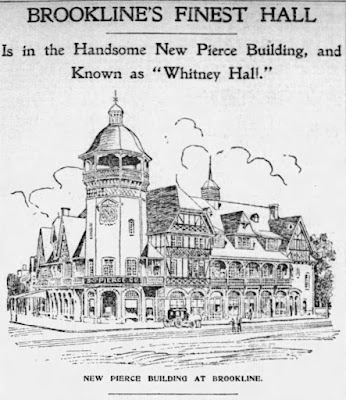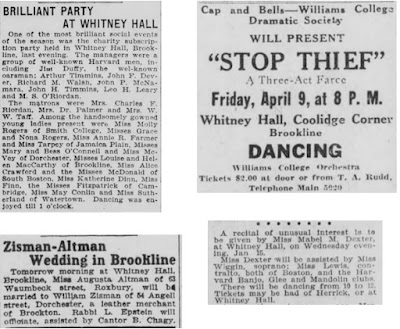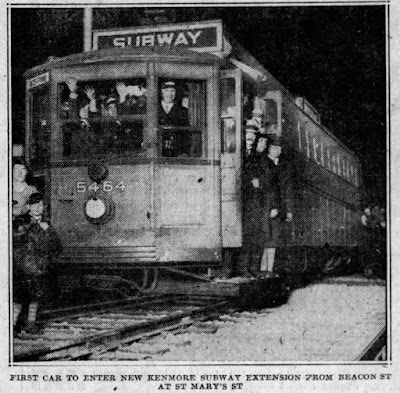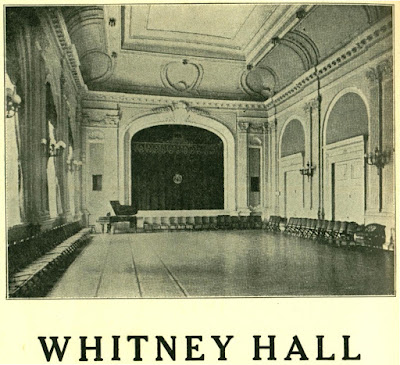 |
| October 24, 1899 |
October 25, 1848 - Water from Brookline Reservoir comes to Boston
October 27, 1880 - Teddy Roosevelt married in Brookline
October 24, 1899 - Whitney Hall opens
October 23, 1932 - Kenmore to St. Mary's subway tunnel
October 25, 1848
Water from Brookline Reservoir comes to Boston
The flow of water from Brookline to Boston was controlled via the gatehouse, still standing today, at the Boylston Street reservoir. In 1902, the reservoir, no longer used for Boston's water supply, was purchased by the town of Brookline and turned into Brookline Reservoir Park.
 |
| These sketches illustrate the exterior of the Brookline Reservoir gatehouse and the interior with a cast iron stairway and pipes that carried water from the reservoir to Boston. |
October 27, 1880
Teddy Roosevelt married in Brookline
Recent Harvard graduate Theodore Roosevelt and Chestnut Hill resident Alice Lee were married, on Roosevelt's 22nd birthday, at the First Parish church in Brookline. The couple moved to New York where the future president began his political career.
 |
| The certificate for the marriage of Theodore Roosevelt and Alice Lee was issued in Newton -- Lee's hometown -- but notes that the wedding took place in Brookline. |
Alice Roosevelt died in 1884 at the age of 22, two days after giving birth to the couple's daughter, Alice. The loss devastated TR, who was said to rarely speak about his first wife thereafter. (He remarried, to a childhood friend, in 1886.)
Brookline was host to another Roosevelt wedding in 1930, when James Roosevelt, son of then New York governor Franklin Roosevelt, was married at St. Paul's Church to Brookline resident Betsey Cushing, daughter of renowned surgeon Harvey Cushing.
October 24, 1899
Whitney Hall opens
The S.S. Pierce Building, constructed between 1898 and 1899, originally included a large function hall on the second floor used for concerts, lectures, weddings, plays, and other events. The hall, which measured 66 feet by 38 feet, was named for Henry Whitney, the developer most responsible for transforming Beacon Street from a narrow country lane to a grand boulevard.
Adjacent to the main hall were a banquet room, a small supper room, a reception room, parlors and women's dressing rooms, and a well-equipped kitchen. The third floor had men's dressing, smoking, and coat rooms.Whitney Hall opens
The S.S. Pierce Building, constructed between 1898 and 1899, originally included a large function hall on the second floor used for concerts, lectures, weddings, plays, and other events. The hall, which measured 66 feet by 38 feet, was named for Henry Whitney, the developer most responsible for transforming Beacon Street from a narrow country lane to a grand boulevard.
Whitney Hall continued to be used for events until the 1950s, when the upper floors were divided into office spaces.
 |
| Advertisements and notices for events and activities in Whitney Hall (Click image for larger view) |
October 23, 1932
Kenmore to St. Mary's subway tunnel
A new subway tunnel carrying trains under Kenmore Square to emerge at the St. Mary's Street stop on Beacon Street in Brookline was officially opened.
A new subway tunnel carrying trains under Kenmore Square to emerge at the St. Mary's Street stop on Beacon Street in Brookline was officially opened.
 |
| Boston Globe, October 24, 1932 |
The tunnel, completed at a cost of $5 million nine months ahead of schedule, was designed to eliminate traffic congestion in the square, where trains and automobiles competed for space. A work force of 1,600 had taken part in the construction of the tunnel and the new Kenmore Station.
Kenmore Square had been known as Governor's Square until 1931, when it was changed by an order passed by the Boston City Council and signed by Governor James Curley. The station was already known as Kenmore after Kenmore Street, a small street intersection Commonwealth Avenue, where it was located.

No comments:
Post a Comment